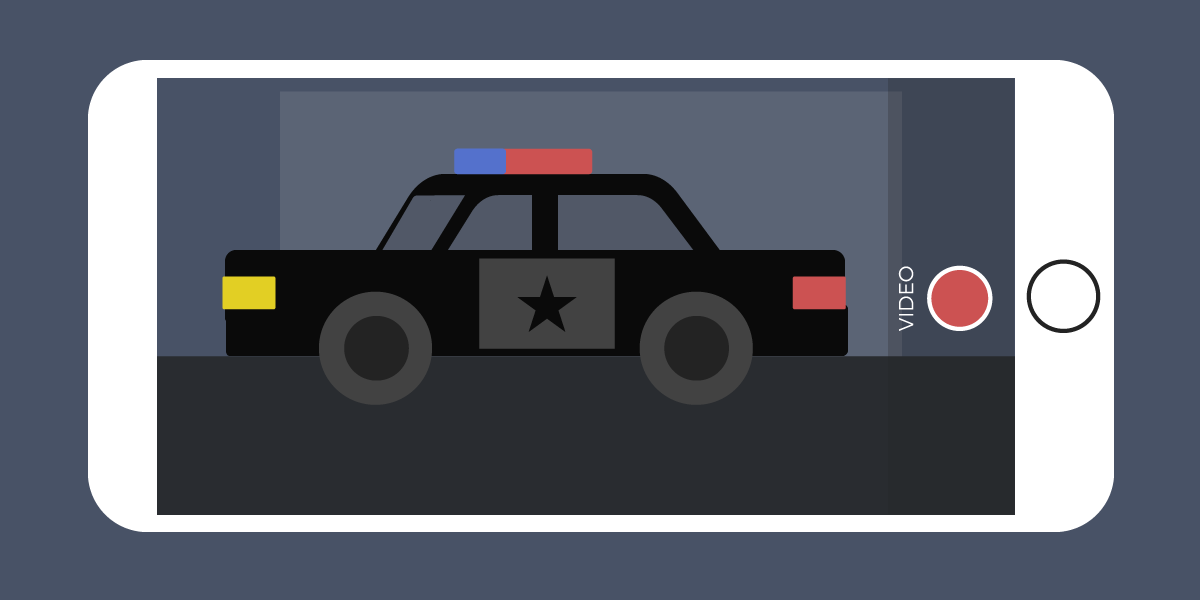


Like the rest of the world, we are horrified by the videos of George Floyd’s murder. Once again, police brutality was documented by brave bystanders exercising their First Amendment rights. Their videos forcefully tell a painful truth that has further fueled a movement to demand an end to racism and abuse of power by police officers.
Recordings of police officers, whether by witnesses to an incident with officers, individuals who are themselves interacting with officers, or by members of the press, are an invaluable tool in the fight for police accountability. Often, it’s the video alone that leads to disciplinary action, firing, or prosecution of an officer.
This blog post provides some practical tips to record the police legally and safely, and explains some of the legal nuances of recording the police.
You have a First Amendment right to record the police. Federal courts and the Justice Department have recognized the right of individuals to record the police. Although the Supreme Court has not squarely ruled on the issue, there is a long line of First Amendment case law from the high court that supports the right to record the police. And federal appellate courts in the First (update: this First Circuit case, too), Third, Fifth, Seventh, Ninth, and Eleventh Circuits have directly upheld this right. EFF has advocated for this right in many amicus briefs.
Federal appellate courts typically frame the right to record the police as the right to record officers exercising their official duties in public. Thus, if the police officer is off-duty or is in a private space that you don’t also have a right to be in, your right to record the officer may be limited.
The right to record the police unequivocally includes the right to take pictures and record video. There is an added legal wrinkle when recording audio—whether with or without video. Some police officers have argued that recording audio without their consent violates wiretap laws. Courts have generally rejected this argument. The Seventh Circuit, for example, held that the Illinois wiretap statute violated the First Amendment as applied to audio recording on-duty police officers.
There are two kinds of wiretaps laws: those that require “all parties” to a conversation to consent to audio recording (12 states), and those that only require “one party” to consent (38 states, the District of Columbia, and the federal statute). Thus, if you’re in a one-party consent state, and you’re involved in an incident with the police (that is, you’re a party to the conversation) and you want to record audio of that interaction, you are the one party consenting to the recording and you don’t also need the officer’s consent. If you’re in an all-party consent state, and your cell phone or recording device is in plain view, your open audio recording puts the officer on notice and thus their consent might be implied.
Additionally, wiretap laws in both all-party consent states and one-party consent states typically only prohibit audio recording of private conversations—that is, when the parties to the conversation have a reasonable expectation of privacy. Police officers exercising their official duties in public do not have any reasonable expectation of privacy. Neither do civilians in public places who speak to police officers in a manner audible to passersby. Thus, if you’re a bystander and want to audio record an officer’s interaction with another person in a public space, regardless of whether you’re in a state with an all-party or one-party consent wiretap statute, you may audio record the encounter.
Finally, the Massachusetts wiretap statute is unique in that it prohibits the secret audio recording of conversations without regard to whether those conversations are private, absent all-party consent. There is a case pending in the First Circuit that is challenging under the First Amendment the Massachusetts wiretap statute to the extent it prohibits secretly audio recording police officers when they are engaged in non-private activities—that is, performing their official duties in public. The plain view rule also applies in this state because, as the First Circuit has held, open recording is not surreptitious. Update: In May 2021, the First Circuit held that individuals have a First Amendment right to secretly audio record police officers performing their official duties in public.
The ability to secretly record the police (whether with photos, video or audio) is critically important given that officers often retaliate against individuals who openly record them. A good example of this is a case that’s currently pending in the Tenth Circuit, in which a bystander used his tablet to record Denver police officers punching a suspect in the face as his head repeatedly bounced off the pavement, and tripping his pregnant girlfriend. The officers retaliated against the recorder by seizing his tablet without a warrant and deleting the video (which he was later able to retrieve).
While the weight of legal authority provides that individuals have a First Amendment right to record the police, courts have also stated one important caveat: you may not interfere with officers doing their jobs.
The Seventh Circuit, for example, said, “Nothing we have said here immunizes behavior that obstructs or interferes with effective law enforcement or the protection of public safety.” The court further stated, “While an officer surely cannot issue a ‘move on’ order to a person because he is recording, the police may order bystanders to disperse for reasons related to public safety and order and other legitimate law enforcement needs.”
Independent recordings of police officers are critical for ensuring police accountability. We urge individuals to keep recording. We hope this blog post helps you to do so legally and safely.